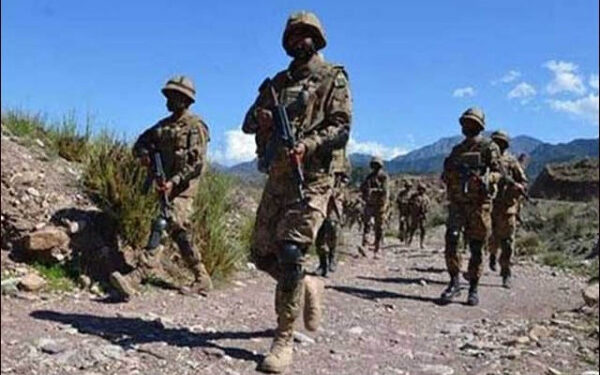A Major Success in the Fight Against Terrorism
In a significant breakthrough in Pakistan’s ongoing war against terrorism, security forces have successfully neutralized 50 Indian-backed Khawarij (terrorists) in a span of just four days. The operations, conducted in the strategically important Zhob district of Balochistan, mark one of the largest counter-terrorism achievements in recent months, according to the Inter-Services Public Relations (ISPR), the media wing of the Pakistan Army.
The series of coordinated operations began on August 7, 2025, and concluded on August 11, 2025, targeting militant hideouts along the Pakistan-Afghanistan border, particularly in the Sambaza area — a known hotspot for cross-border militant infiltration.
Breakdown of the Four-Day Operation
According to ISPR, the counter-terrorism mission was carried out in two major phases:
Phase One: August 7–9
From August 7 to 9, security forces launched precision-based intelligence-led operations in Sambaza, a rugged and mountainous terrain notorious for being a safe haven for terrorists. The operations were supported by aerial surveillance, ground troops, and intelligence units.
During this first phase, 47 Khawarij were eliminated, dismantling several entrenched positions used by the militants for launching attacks inside Pakistan. In addition to the high number of casualties, a large cache of weapons, ammunition, and explosive devices was recovered.
Phase Two: August 10–11
Following the initial success, a clearance operation was launched on the night of August 10–11 in the outskirts of Sambaza. This phase was aimed at ensuring that no remaining militants could regroup and pose a renewed threat.
During these intense encounters, three more terrorists were killed. The military also seized more sophisticated weaponry and explosive materials, further crippling the operational capabilities of the militant network.
Strategic Importance of Sambaza and the Zhob District
Sambaza’s location along the Pakistan-Afghanistan border makes it a crucial point in Pakistan’s counter-terrorism strategy. Its mountainous terrain and difficult accessibility have made it a favored hideout for terrorist groups seeking to exploit cross-border movement for training, recruitment, and launching attacks.
The Khawarij targeted in this operation were reportedly receiving logistical and financial support from hostile foreign intelligence networks, particularly those with backing from India, as per ISPR’s statement. This underscores the geopolitical dimension of Pakistan’s fight against terrorism, where external state actors allegedly fuel unrest through proxy militant groups.
Weapons and Equipment Seized
During the operations, security forces recovered:
- Assault rifles and sniper rifles
- Rocket-propelled grenades (RPGs)
- Improvised explosive devices (IEDs)
- Large quantities of ammunition
- Military-grade communication devices
These seizures not only prevent immediate threats but also help dismantle future operational planning by such groups.
Pakistan’s Counter-Terrorism Efforts and Challenges
The ISPR reiterated that Pakistan’s security forces remain resolute in their mission to defend the homeland and protect its borders from internal and external threats. The statement emphasized that any attempt to undermine Pakistan’s peace, stability, and development will be met with decisive force.
Over the past two decades, Pakistan has faced multiple waves of terrorism, primarily in Khyber Pakhtunkhwa and Balochistan, regions that share porous borders with Afghanistan. Despite major operations like Zarb-e-Azb (2014) and Radd-ul-Fasaad (2017), militant networks continue to attempt resurgence, often with foreign backing.
Indian Involvement: A Persistent Concern
The term “Indian-backed Khawarij” used by ISPR points toward Pakistan’s long-standing allegations of India’s involvement in sponsoring terrorism within its borders.
Pakistani intelligence agencies have repeatedly presented evidence — including confessions from captured operatives — linking such groups to Indian intelligence networks aiming to destabilize Pakistan, particularly in resource-rich but politically sensitive regions like Balochistan.
These allegations gained international attention with the arrest of Kulbhushan Jadhav, an Indian national and former naval officer, in 2016, who confessed to aiding separatist and militant activities in Balochistan and Karachi.
Local Impact and Civilian Concerns
While these operations are a major blow to terrorist networks, they also have significant implications for local populations. Areas like Zhob and Sambaza often experience temporary displacement, restrictions on movement, and heightened security measures during military actions.
However, many residents have expressed relief over the elimination of such militant elements, noting that their presence had led to:
- Threats to local businesses
- Kidnappings for ransom
- Disruption of trade and travel routes
- Fear among farmers and herders
By restoring control over these areas, the security forces aim to facilitate the return of normalcy and open the way for economic and social stability.
International and Domestic Reactions
Domestically, political leaders and citizens have praised the operations, calling them a testament to the professionalism and dedication of Pakistan’s armed forces. Social media platforms have seen an outpouring of support, with hashtags like #SaluteToPakArmy and #OperationSambaza trending nationwide.
Internationally, Pakistan continues to push for recognition of the sacrifices its security forces make in the global fight against terrorism. Officials have urged the international community to acknowledge and condemn any external support provided to militant groups operating against Pakistan.
A Message from ISPR
The ISPR concluded its statement with a strong message:
“The Pakistan Army is committed to defending the homeland, safeguarding its borders, and ensuring that peace prevails in every corner of the country. The blood of our martyrs will not go in vain, and those who seek to disrupt Pakistan’s progress will be dealt with firmly.”
Looking Ahead: The Road to Lasting Peace
While the elimination of 50 terrorists is a remarkable achievement, security experts caution that this is not the end of the threat. Militant networks often operate in fluid, decentralized structures, allowing them to regroup unless continuous vigilance is maintained.
Pakistan’s long-term counter-terrorism strategy will require:
- Sustained intelligence-based operations
- Enhanced border management
- Regional cooperation with Afghanistan and other neighbors
- Economic uplift of terrorism-affected areas
- Counter-radicalization programs to prevent youth recruitment
Conclusion
The recent operations in Zhob and Sambaza are a decisive step in dismantling a dangerous network of Indian-backed Khawarij, reaffirming Pakistan’s commitment to peace, stability, and national security. As the fight against terrorism continues, the bravery and sacrifice of the country’s security forces remain a source of national pride and a key pillar in the ongoing struggle for a safe and prosperous Pakistan.

























